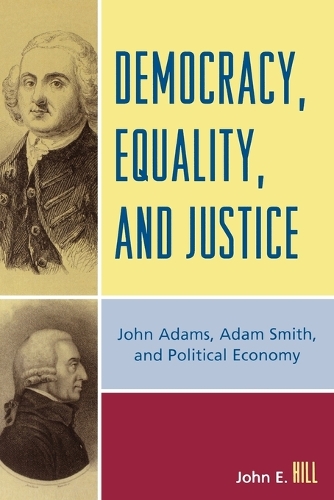
Democracy, Equality, and Justice: John Adams, Adam Smith, and Political Economy
(Paperback, Second Edition)
Publishing Details
Democracy, Equality, and Justice: John Adams, Adam Smith, and Political Economy
By (Author) John E. Hill
Bloomsbury Publishing PLC
Lexington Books
18th July 2007
Second Edition
United States
Classifications
General
Non Fiction
Political economy
320.01
Physical Properties
Paperback
286
Width 153mm, Height 231mm, Spine 22mm
422g
Description
Challenging common interpretations of the political thought of John Adams and Adam Smith, Democracy, Equality and Justice offers an engaging and novel portrait of the political economy in America at its founding. The founders believed that liberty should not trump community, but should exist within the context of community. Drawing on extensive written records of the thought of John Adams and Adam Smith, the father of modern capitalism, Dr. John E. Hill argues that these two great men advocated a balanced, values-based, and just political economy. Adams, historically misperceived as a rugged individualist who favored aristocracy over democracy, actually emphasized political balance with no one socio-economic class dominating any other. Smith, incorrectly portrayed as a supporter of laissez-faire government, advocated economic balance with no class or individual receiving special treatment from the government. Applying their values of universalism and moderation today would significantly broaden the definition of morality in contemporary politics. Democracy, Equality and Justice is a stimulating and sophisticated text that will encourage debate over the relationship between historical ideas and contemporary economic problems.
Reviews
Democracy, Equality and Justice is a passionate and innovative reinterpretation of the Revolutionary generation's political, economic, and social values. Drawing intellectual continuities between the work of John Adams and Adam Smith, Hill reconstructs the commercial humanism, strong sense of community, and republican virtue central to their ideas. Further, he argues that by revisiting and applying these values we might reform our own society. This is a valuable and refreshing contribution to the study of political economy, politics, and our many varieties of liberalism. -- Jose Torre, Author of The Political Economy of Sentiment: Paper Credit and the Scottish Enlightenment in Early Republic Boston, 1780-1820
This ambitious combination of intellectual history and social theory highlights neglected elements in the work of both John Adams and Adam Smith. Americans of all political stripes would profit from the wisdom in John Hill's book. -- Chris Beneke, Author of Beyond Toleration: The Religious Origins of American Pluralism, author of Beyond Toleration: The Religious Origins of American Pluralism
Original and thoughtful. John Hill shows that John Adams and Adam Smith deserve to be reread for insights into contemporary problems of American government and foreign policy. -- David Bayley, Distinguished Professor, State University of New York at Albany
Author Bio
John E. Hill is professor of politics and history at Curry College in Milton, Massachusetts. For more information, visit http://stumail.curry.edu/~jhill/.
